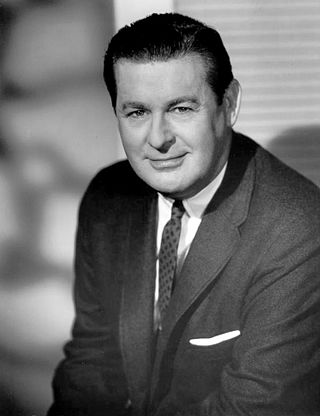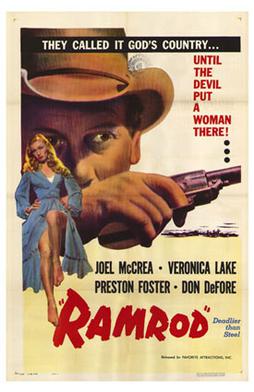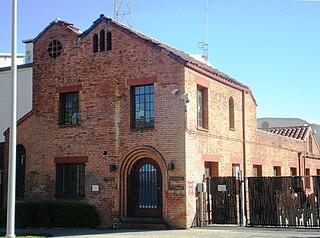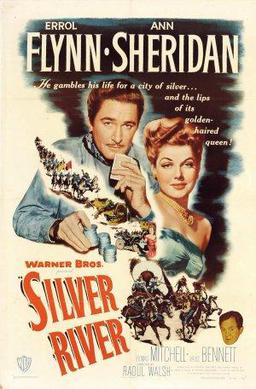
The Bells of St. Mary's (1945) is an American musical comedy-drama film, produced and directed by Leo McCarey and starring Bing Crosby and Ingrid Bergman. Written by Dudley Nichols and based on a story by McCarey, the film is about a priest and a nun who, despite their good-natured rivalry, try to save their school from being shut down. The character Father O'Malley had been previously portrayed by Crosby in the 1944 film Going My Way, for which he won the Academy Award for Best Actor. The film was produced by Leo McCarey's production company, Rainbow Productions.

Josephine Owaissa Cottle, known professionally as Gale Storm, was an American actress and singer. After a film career from 1940 to 1952, she starred in two popular television programs of the 1950s, My Little Margie and The Gale Storm Show. Six of her songs were top ten hits. Storm's greatest recording success was a cover version of "I Hear You Knockin'," which hit No. 2 on the Billboard Hot 100 chart in 1955.

Nancy Walker was an American actress and comedian of stage, screen, and television. She was also a film and television director. During her five-decade-long career, she may be best remembered for her long-running roles as Mildred on McMillan & Wife and Ida Morgenstern, who first appeared on several episodes of The Mary Tyler Moore Show and later became a prominent recurring character on the spinoff series Rhoda.

Charles Sherman Ruggles was an American comic character actor. In a career spanning six decades, Ruggles appeared in close to 100 feature films, often in mild-mannered and comic roles. He was also the elder brother of director, producer, and silent film actor Wesley Ruggles (1889–1972).

Monogram Pictures Corporation was an American film studio that produced mostly low-budget films between 1931 and 1953, when the firm completed a transition to the name Allied Artists Pictures Corporation. Monogram was among the smaller studios in the golden age of Hollywood, generally referred to collectively as Poverty Row. Lacking the financial resources to deliver the lavish sets, production values, and star power of the larger studios, Monogram sought to attract its audiences with the promise of action and adventure.

Donald John DeFore was an American actor. He is best known for his roles in the sitcom The Adventures of Ozzie and Harriet from 1952 to 1957 and the sitcom Hazel from 1961 to 1965, the former of which earned him a Primetime Emmy Award nomination.

Frankie Darro was an American actor and later in his career a stuntman. He began his career as a child actor in silent films, progressed to lead roles and co-starring roles in adventure, western, dramatic, and comedy films, and later became a character actor and voice-over artist. He is perhaps best known for his role as Lampwick, the unlucky boy who turns into a donkey in Walt Disney's second animated feature, Pinocchio (1940). In early credits, his last name was spelled Darrow.

The Underworld Story is a 1950 American film noir crime film directed by Cy Endfield and starring Dan Duryea, Herbert Marshall, Gale Storm, Howard Da Silva and Michael O'Shea. Da Silva plays the loud-mouthed gangster Carl Durham, one of his last roles before becoming blacklisted.

Ramrod is a 1947 American Western film directed by Andre de Toth and starring Joel McCrea, Veronica Lake, Preston Foster and Don DeFore. This cowboy drama from Hungarian director de Toth was the first of several films based on the stories of Western author Luke Short. De Toth's first Western is often compared to films noir released around the same time. Leading lady Veronica Lake was then married to director de Toth. The supporting cast features Donald Crisp, Charles Ruggles, Lloyd Bridges and Ray Teal.

Victor Fred Moore was an American actor of stage and screen, a major Broadway star from the late 1920s through the 1930s. He was also a writer and director, but is best remembered today as a comedian, playing timid, mild-mannered roles. Today's audiences know him as the star of a Christmas-themed movie that has become a perennial: It Happened on 5th Avenue (1947). Moore plays a vagrant who occupies a millionaire's mansion—without the millionaire's knowledge—while the owner is vacationing.

Red Light is a 1949 American film noir crime film directed and produced by Roy Del Ruth, starring George Raft and Virginia Mayo, and based on the story "This Guy Gideon" by Don "Red" Barry, featuring strong religious overtones.

Wheeler Oakman was an American film actor.

No Time for Comedy is a 1940 American comedy-drama film based on the play of the same name by S. N. Behrman, starring James Stewart, Rosalind Russell, Genevieve Tobin and Charlie Ruggles.

Fifth Avenue Girl, sometimes stylized as 5th Ave Girl, is a 1939 RKO Radio Pictures comedy film directed by Gregory La Cava and starring Ginger Rogers, Walter Connolly, Verree Teasdale, and James Ellison. The screenplay was written by Allan Scott with uncredited contributions by La Cava and Morris Ryskind.

The KCET Studios, located at 4401 Sunset Boulevard in Hollywood, California is the longest continuously-producing studio in Hollywood. Since its establishment in 1912, the studios located at the site have been the home of motion picture producers, including Lubin, Essanay, Willis and Inglis, J.D. Hampton, Charles Ray, Ralph Like, Monogram Pictures, Allied Artists, and ColorVision. Since 1970, it has been the home of public television station KCET, but in April 2011, KCET announced that it had sold the facility to the Church of Scientology.

Silver River is a 1948 American western film directed by Raoul Walsh and starring Errol Flynn, Ann Sheridan and Thomas Mitchell. The film is based on a Stephen Longstreet story that was turned into a novel. It was produced and distributed by Warner Bros.

Slippy McGee is a 1923 American silent drama film directed by Wesley Ruggles and based on the book Slippy McGee: Sometimes Known as the Butterfly Man by Marie Conway Oemler that was published in 1917. The film was an Oliver Morosco Production released by Associated First National and featured actress Colleen Moore as Mary Virginia. It is not known whether the film survives.

The Dude Goes West is a 1948 American comedy western film starring Eddie Albert and Gale Storm. It was directed by Kurt Neumann and released by Monogram Pictures. The film was originally known as Tombstone.

Forever Yours is a 1945 American drama film directed by William Nigh and starring Gale Storm, C. Aubrey Smith and Johnny Mack Brown. It was made by Monogram Pictures. Although the studio concentrated on low-budget films, this was one of the company's more prestigious releases of the year.

Violent Night is a 2022 American Christmas action comedy film directed by Tommy Wirkola and written by Pat Casey and Josh Miller. It follows Santa Claus as he fights mercenaries who have taken a wealthy family hostage in their home. The film also stars John Leguizamo, Alex Hassell, and Beverly D'Angelo.




















